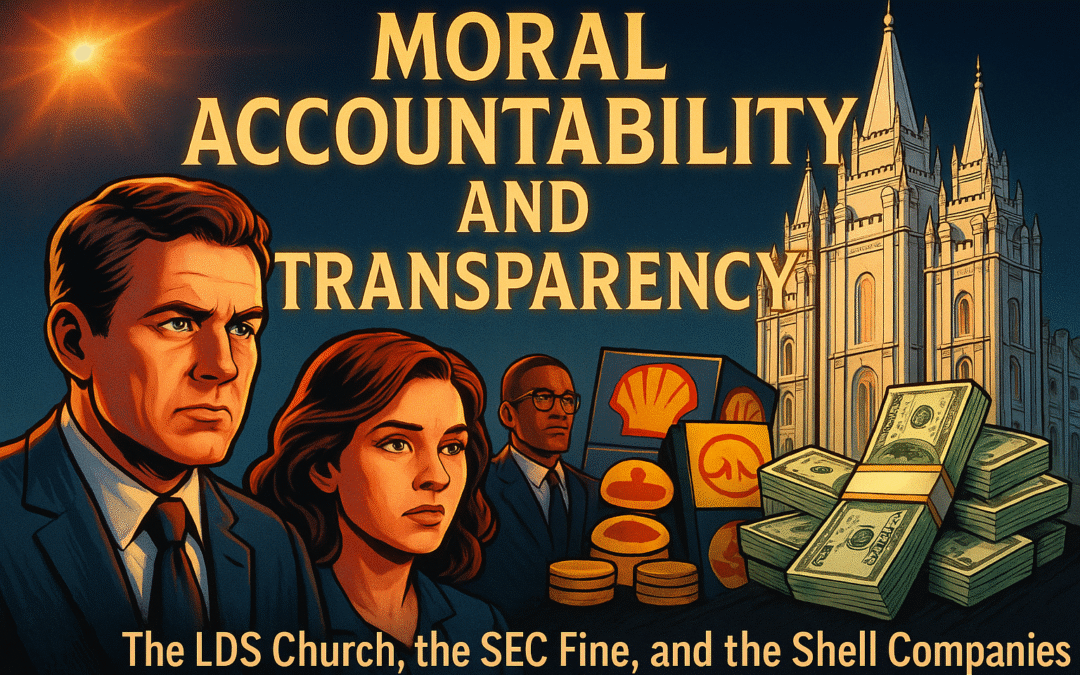Bottom Line
This isn’t about whether the Church can have wealth. It’s about whether it will honor God in how it stewards that wealth. Legal strategies matter—but moral accountability matters more. Members deserve not only reassurance, but real transparency. And the Lord, if He truly leads the Church, requires nothing less.
The LDS Church, the SEC Fine, and the Shell Companies: A Spiritual and Practical Analysis
📜 The Background
In February 2023, the U.S. Securities and Exchange Commission (SEC) fined Ensign Peak Advisors (EPA)—the investment arm of The Church of Jesus Christ of Latter-day Saints—$4 million, and the Church itself $1 million. The SEC found that from 1997 to 2019, Ensign Peak used 13 shell LLCs to file misleading investment disclosures, effectively concealing the true size and identity of the Church’s investment portfolio (then worth over $30 billion; now estimated near $100 billion). The Church settled without admitting wrongdoing.
The SEC’s report states the Church went to “great lengths” to avoid disclosure, a phrase many critics interpret as confirming systemic deception.
🧭 LDS Doctrine on Honesty and Obedience to Law
Latter-day Saints hold honesty as a sacred covenantal principle, not just an ethical guideline. It’s embedded in:
- Temple recommend interviews: “Are you honest in your dealings with your fellow men?”
- Articles of Faith #12 & #13: “We believe in being honest, true, chaste…”
- Scripture:
- D&C 134:6 – “We believe that all men are bound to sustain and uphold the respective governments in which they reside.”
- Alma 27:27 – “They were distinguished for their zeal… and their honesty.”
Thus, when an institution that proclaims divine guidance is caught violating federal disclosure laws—even civilly—it invites spiritual scrutiny as well as public criticism.
🧠 Why the Church Did It: The Institutional Logic
The Church has stated that it sought to:
- Preserve the sanctity of sacred funds by avoiding public scrutiny and speculation.
- Protect donor privacy to discourage targeting or harassment.
- Prevent manipulation or market distortion caused by public knowledge of its financial footprint.
In effect, the Church was using perfectly legal strategies—until the SEC ruled that the intent behind those strategies constituted misleading conduct under securities law.
🛡️ The Legal Line Crossed
- Using LLCs to manage investments is not inherently illegal.
- But intentionally masking control and beneficial ownership over $100 billion in assets year after year violated SEC transparency rules.
- Once exposed, Ensign Peak began filing properly in 2020 and settled the case civilly.
🙏 Spiritual Analysis: Where the Church Fell Short
Despite legal motivations, the spiritual concern is this:
⚖️ Intent matters. So does perception.
Even if Church lawyers believed they were acting within the law, the intent to obscure violates the higher law of moral honesty—especially for a Church that requires moral rectitude from its members.
Scriptures reinforcing this principle:
- Mosiah 2:22 – “He doth require that ye should do as he hath commanded you… and be honest.”
- 2 Corinthians 8:21 – “Providing for honest things, not only in the sight of the Lord, but also in the sight of men.”
🧎♂️ Shouldn’t the Lord’s Church Lead by Example?
Members pay tithing in faith, often at personal sacrifice. Discovering that their sacred funds were protected by a shell game—even if well-intentioned—has rightly provoked disappointment, anger, and demands for accountability.
💡 Why Did the SEC Fine Matter So Much?
- It confirmed long-standing suspicions about financial secrecy.
- It contrasted with the Church’s teachings about integrity.
- It revealed dissonance between global financial reality and local member experience.
🧭 The Best Defense: Context, Not Excuses
A fair rebuttal acknowledges the Church’s missteps but also frames the institutional context:
- The Church did not engage in fraud, embezzlement, or insider trading.
- It has since changed its practices and now complies with disclosure laws.
- No funds were lost or stolen.
- Intent was institutional privacy, not personal gain.
- All major religions use tax-exempt strategies to some extent.
But again—“To whom much is given, much is required.”
💬 Balanced Bottom Line
The LDS Church made a serious error in prioritizing financial opacity over transparency. Though not criminal, its legal workaround violated the spirit of its own doctrine on honesty. It must now earn back the trust of its members through transparency, humility, and clear accountability.
📖 Recommended Actions for the Church (Spiritually and Practically)
- Public repentance and acknowledgment, not just legal compliance.
- Detailed annual financial disclosures to members.
- Increase humanitarian aid and ward budgets.
- Model institutional integrity alongside personal virtue.
- Demonstrate that sacred funds serve sacred ends.

